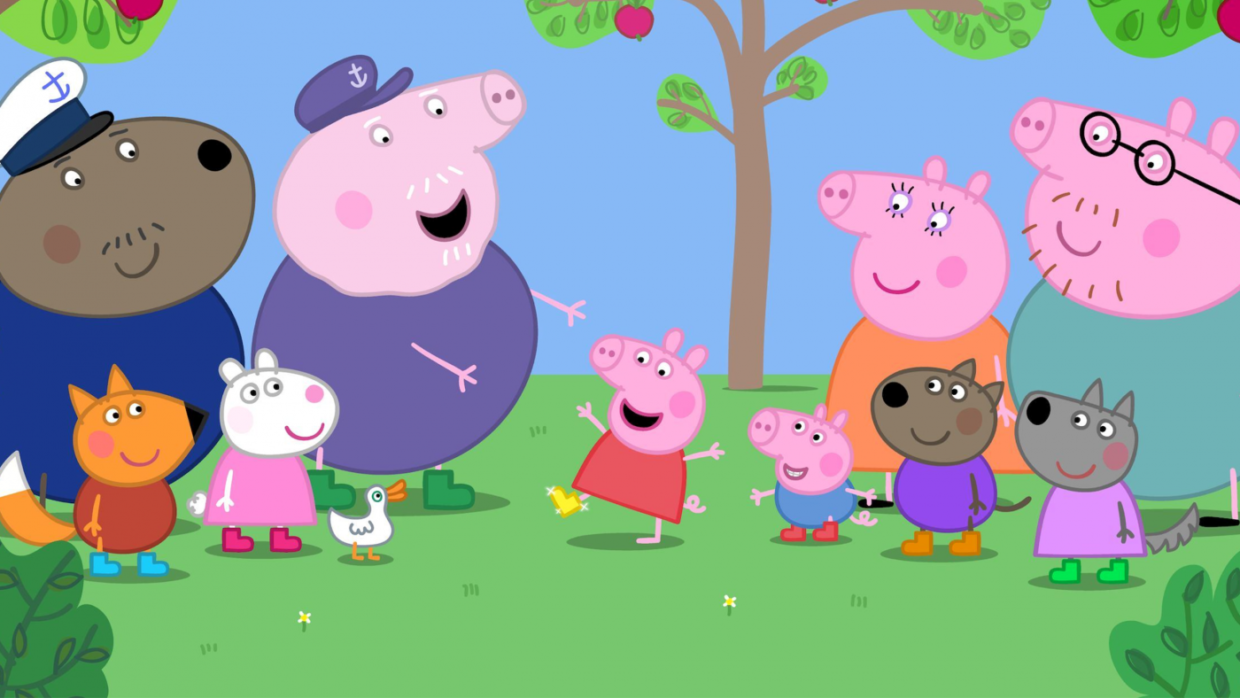
6 March 2019
Is Peppa Pig really changing your child’s accent?
It’s called the Peppa Pig Effect, and parents are documenting it on Twitter with the hashtag #PeppaEffect. American and Canadian parents seem to oscillate between being bemused, charmed and irritated by their children’s apparent adoption of a British accent after binge-watching episode after episode of Peppa Pig.
The animated series following young Peppa, her brother George, Mummy and Daddy Pig and their friends (made up of an eclectic assortment of other animals, including Suzy Sheep, Zoe Zebra and Rebecca Rabbit) is a British cartoon that is 70% owned by Canadian company Entertainment One. Distributed in 180+ territories, it is nothing short of a global phenomenon.
The Peppa Pig YouTube channel has more than 7 million subscribers, and the series, made up of five-minute-long episodes, has expanded to include a number of longer-running standalone specials, such as Peppa’s Pumpkin Party, Peppa Pig: Christmas Party and Peppa and her Golden Boots.
With this kind of reach and influence, it’s not surprising that the show is affecting its audience, mostly made up of children between the ages of two and six, in profound ways. And it’s not just parents living in North America who have noticed their children speaking a toddler version of the Queen’s English since becoming fans of the show.
Earlier this year, a number of South African parents called into Eusebius McKaiser’s show on 702 to describe how their children were mimicking Peppa’s speech. One father credited Peppa Pig with improving his son’s language skills, saying “you speak according to what you are exposed to”.
Some experts agree, such as Roberto Rey Agudo, a language programme director at Dartmouth College, who was interviewed by the online moms’ mag Romper. This is because even very young children pick up the differences between the way Peppa speaks, such as eliding over the “r” sound after vowels, and the way everyone else does. Toddlers’ neuroplasticity means they’re adept at adopting new accents if that’s what they’re exposed to, Agudo says – and when they’re binge-watching highly addictive episodes of Peppa Pig, her accent is the one they’ll pick up.
But other experts are “suspicious” of the idea that a single TV show could change a child’s accent. Dr Susannah Levi of New York University thinks it’s more likely that children will adopt specific words from Peppa Pig, or other influential TV shows, especially if the child doesn’t hear the word in their real-life community very often – such as “zeh-bra” instead of “zee-bra” or the British (and South African English) pronunciation of “tomato”.
Dr Lisa Davidson, chair of linguistics at the same university, agrees. “Kids at that age are certainly aware of those types of differences and can mimic them, too”, she says. But when children watch a TV show in a dialect that is not native to where they live, it is unlikely that they’d generate whole new utterances they’ve never heard before in that particular dialect or accent, as opposed to in their own much more familiar native dialect.
So, while it’s unlikely that Peppa Pig would cause your kids to pick up an entirely new accent, it will probably inspire them to copy specific words and phrases, such as “Mummy”, “Oh, it’s impossible!” … and “Bing bong boo, bingly bongly boo”.
Want to test this out on your own progeny?
Seasons 1 and 2 of Peppa Pig are available to stream or download on Showmax, as well as the Peppa Pig Halloween and Christmas Specials, plus Peppa Pig: Around the World and Peppa and her Golden Boots.
The Winning Ticket, a Showmax Original
Youngins S1 episodes 1-20 recap
More Mzansi gold

Interview: Knock knock, it’s Youngins’ Tshepo!
Tshepo Matlala talks about how he brings class clown Tshepo’s jokes to life, and what’s behind the mask, in Showmax Original Youngins.

Siyabonga Thwala stars in action-packed Empini
Showmax announces new action-drama series Empini, starring three-times SAFTA winner Siyabonga Thwala. Premieres 23 May on Showmax.

The Mommy Club S2 episode 9 recap: Mrs Mops’ launch event
In episode 9 of The Mommy Club, Mrs Mops launches her skincare range and Barbra and Mantshi make amends. New episodes every Monday.

The Real Housewives of Durban S4: No apology for Ameigh
In episode 11 of The Real Housewives of Durban Season 4, wounds are opened when Ameigh finally hears the infamous Zama recording.
